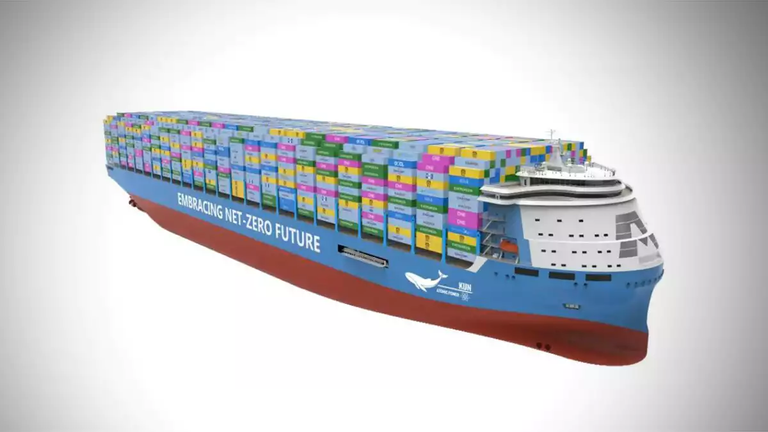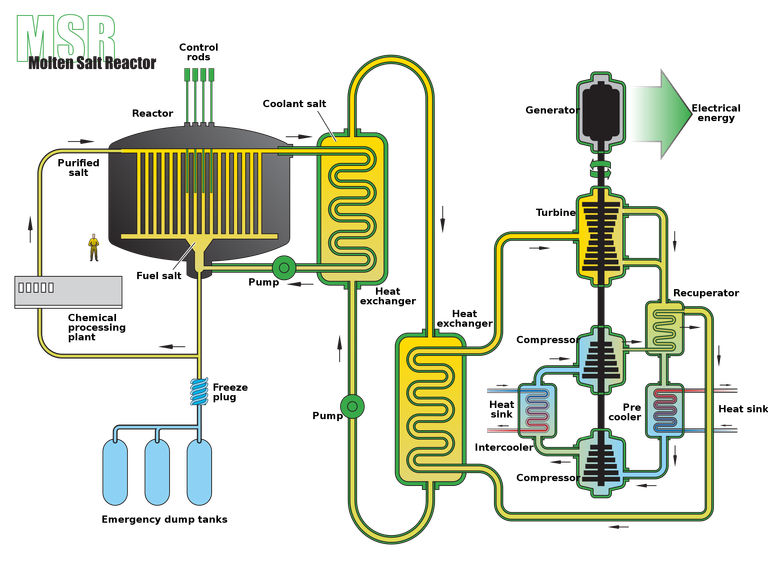Moving goods without burning oil?
24000 containers on a boat.
Today I read this news at Heise.de and decided to have a little research on this and some more facts. The China State Shipbuilding Corporation Limited announced this lately.

Bild: China State Shipbuilding Corporation Limited
Hey Hive Family
let us travel the world again
Chinese shipyard introduces large, nuclear-powered container ship
A story by the news from Heise.de translated by me and some language tools
A Chinese shipyard aims to make nuclear-powered container ships mainstream. The state-owned shipyard presented plans for a large, nuclear-powered container ship at a maritime expo in China. Named KUN-24AP, the model is designed to carry up to 24,000 twenty-foot equivalent units (TEUs) and is nearly climate-neutral, as announced by Jiangnan Shipyard, part of the China State Shipbuilding Corporation Limited. While ships with this capacity exist, none are nuclear-powered.
Nuclear-powered ships have not been successful in commercial shipping in the past, but the KUN-24AP, presented at "Marintec China" in Shanghai, is seen as having potential due to growing pressure to build low or zero-emission ships. Experts note that nuclear-powered ships have the economic advantage of not requiring frequent refueling, avoiding significant price fluctuations.
The ship is expected to use a Molten Salt Reactor, likely fueled by thorium, which is abundantly and cheaply available in China. This reactor type, operating at atmospheric pressure, virtually eliminates the risk of a meltdown and steam explosions, and allows for rapid shutdown in emergencies.
Other countries are also researching this propulsion type. However, the success of such ships depends not only on the acceptance of the new technology by shipping companies but also on ports' readiness to accommodate nuclear-powered container ships.
What is a Molten Salt Reactor
The Molten Salt Reactor (MSR) is an innovative type of nuclear reactor where the nuclear fuel is dissolved in a molten salt mixture. Unlike conventional reactors that use solid fuel rods, MSRs use liquid fuel, which can improve safety and efficiency. The molten salt acts as both the fuel and coolant, reducing the risk of a meltdown. These reactors can operate at atmospheric pressure, further enhancing safety by reducing the risk of steam explosions. MSRs are also versatile, potentially able to use various nuclear fuels including thorium, which is more abundant than uranium.
Read more about the MSR at this article at wikipedia.org

Picture by Wikipedia
Pros and Cons of a Molten Salt Reactor
Molten Salt Reactors (MSRs) have several pros and cons:
Pros:
- Safety: MSRs operate at atmospheric pressure, reducing the risk of explosions. The liquid fuel allows for a safer shutdown in emergencies.
- Efficiency: They can potentially use various fuels, including thorium, which is more abundant and produces less nuclear waste than uranium.
- Less Waste: MSRs produce less long-lived radioactive waste.
Additional Pros:
- Versatility: They can operate at various temperatures and can be adapted for different applications.
- Burn-up Efficiency: MSRs can potentially achieve higher burn-up of fuel, meaning more energy is extracted.
- Reduction in Proliferation Risk: Some designs limit the production of weapons-grade materials.
Cons:
- Corrosion: The high-temperature salt can be corrosive to materials used in the reactor.
- Development Stage: MSRs are still largely experimental and not widely implemented.
- Complexity: The handling and processing of liquid fuel are more complex than solid fuel.
Additional Cons:
- Technical Challenges: The technology requires advanced materials to withstand the harsh conditions inside the reactor.
- Waste Management: Although MSRs produce less waste, the waste they do produce can be more challenging to handle and store.
- Regulatory Hurdles: Lack of existing regulatory frameworks for this new type of reactor can delay development and implementation.
Does this solve the issue
I would love to discuss this, as I can't oversea all the details but the idea seems to be interesting

Picture by jooinn.com
Have a great day everybody
and let us travel the world again

pic by @detlev
Enjoy the #BeerSaturday
have 3 pics and a story
around beer - and go!

@Detlev loves HIVE
Cool idea! First thing that popped up in my mind was piracy. Would these be a desired target for modern piracy somehow?
Shure but this things are huge.
Guess you can build them a bit more piracy safe that other older ships
I had to think about captain Phillips 😅But true! I saw the Ever Ace in Rotterdam. It makes you realize the scale at which we move things around on this planet!
Mind blowing 👍
Looking to solving current problems is interesting, some good ideas starting to surface around the world.
Discussion over pros and cons always necessary to debate before entering into new technology. Finding possible uses of far more economic solutions have been found over the years, pressure from guzzling greed silences most innovation.
@tipu curate
Upvoted 👌 (Mana: 54/64) Liquid rewards.
Thorium powered nuclear powerplants are the future of fission.
Didn't had this on my radar - to be honest.
I worked in the nuclear industry for a long time. The things that stand out to me are:
"Development Stage: MSRs are still largely experimental and not widely implemented."
"Technical Challenges: The technology requires advanced materials to withstand the harsh conditions inside the reactor."
"Waste Management: Although MSRs produce less waste, the waste they do produce can be more challenging to handle and store."
The first two mean that this technology is not even close to maturity - a new reactor type is not something you want to rush out into industry. The requirement for advanced materials means the need for significant testing, mostly likely within a reactor environment - that element alone is huge and will costs crazy money. Rushing this and not getting it right could have significant consequences. Its just alarm bells over to me.
The third item is also significant. Yes I can see the reduced carbon side of things, but the handling of the waste is an environmental problem all in itself. The wastes from reactors can be hazardous for 10s of thousands of years (and more). Waste management would need to be fully designed and considered, with the costs for the handling after use figured into the profitability of the ship. Are shipping companies really going to honor that management for years and years after the ship is no longer in the use ? I doubt it, and where will the burden end up - bottom of the sea maybe, that would be an even bigger environmental problem.
Investing in advanced sail technology along with solar powered propulsion systems is a much better option. Just my opinion !
Thanks
Wow - this is why I love hive. Somewhere the someone who knows the topic.
Thanks for the quick and qualified feedback.
At least a !BEER from me.
View or trade
BEER.Hey @hoosie, here is a little bit of
BEERfrom @detlev for you. Enjoy it!Did you know that <a href='https://dcity.io/cityyou can use BEER at dCity game to buy cards to rule the world.
Congratulations @detlev! You have completed the following achievement on the Hive blockchain And have been rewarded with New badge(s)
Your next target is to reach 26000 replies.
You can view your badges on your board and compare yourself to others in the Ranking
If you no longer want to receive notifications, reply to this comment with the word
STOPCheck out our last posts:
Ohhh I would love to be on this ship!